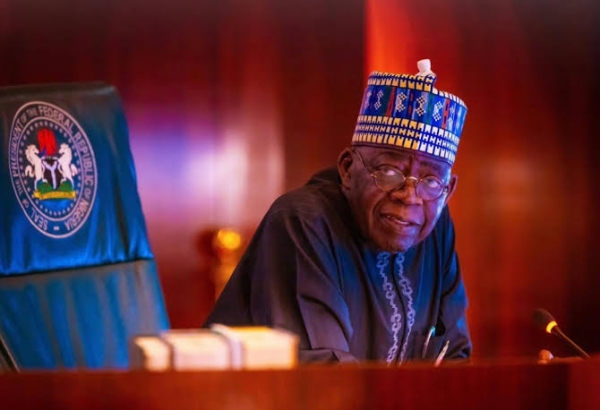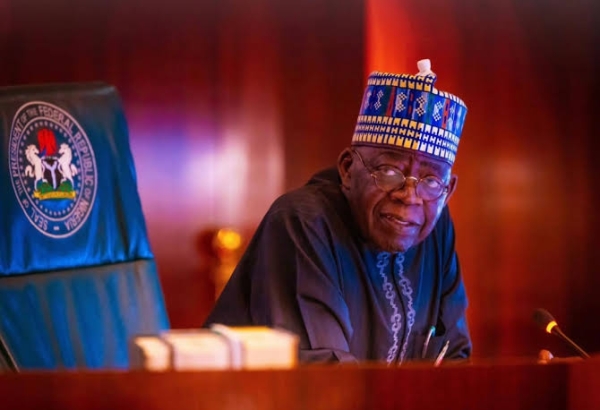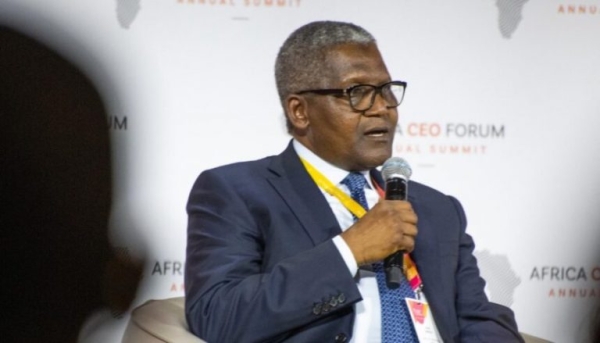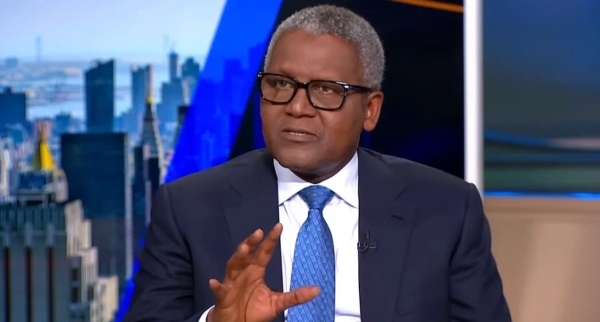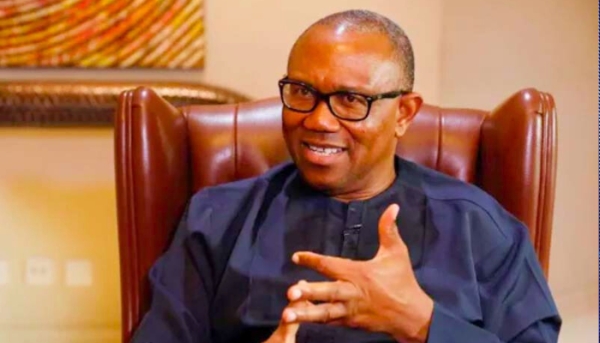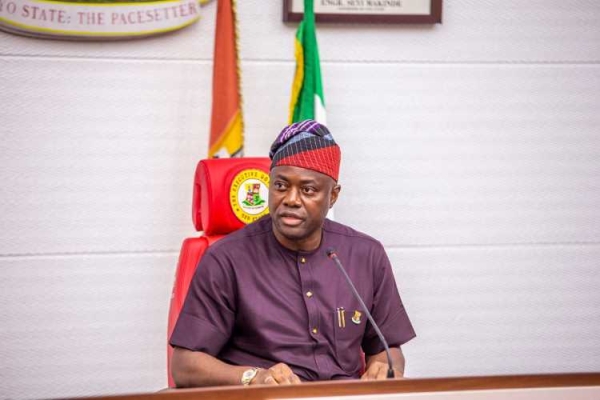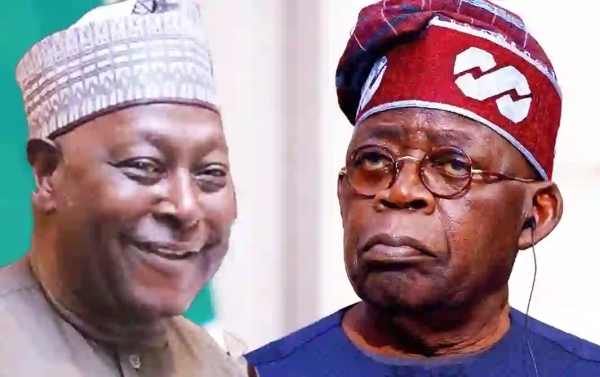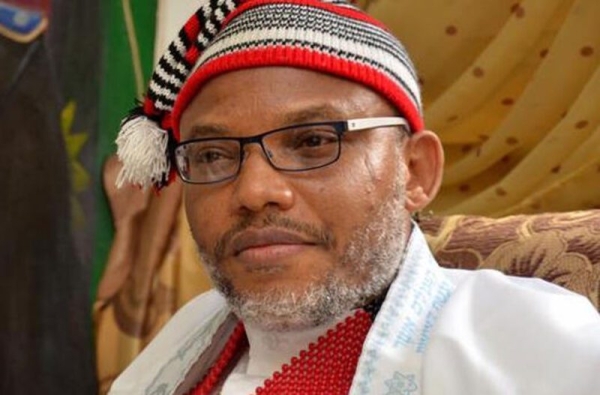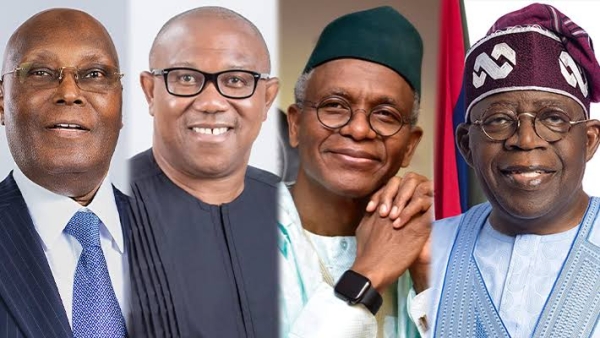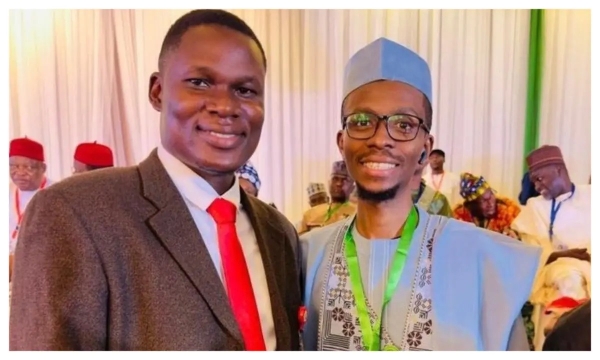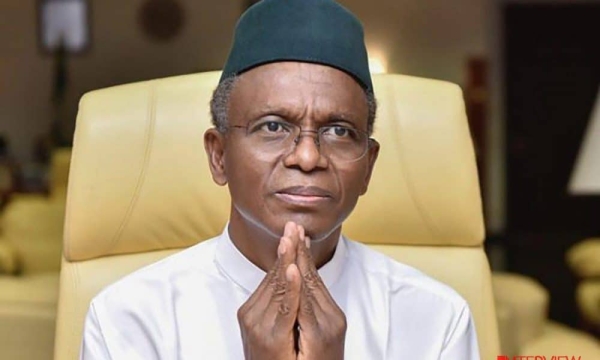TOP NEWS
Reuben's View
Latest News
Search
MOST READ
-
DSS Builds Islamic School In Kaduna, Names It After President Bola Tinubu
-
No documentation of $400,000 I handed to Emefiele, EFCC witness tells court
-
‘This chapter is over’, Ronaldo hints at Al Nassr exit
-
Reps panel summons FCT minister of state for ‘ignoring’ budget defence
-
[OPINION] Octopus Wike And The PDP - Reuben Abati
-
Nigerian Economy Worse Off Under Tinubu Than Buhari — Economist, Erumebor
-
Tinubu seeks Reps’ approval for $21.5bn external loan, ₦757.9bn pension bond
-
Saudi govt to fund Osimhen’s move to Al Hilal
-
12 children rescued as police arrest couple for ‘child trafficking’ in Abia
-
FG Sets Up Ministerial Committee For Abuja Forfeited 753-Unit Estate
-
Remember You Are Not Taking Money To Grave – Dangote To Politicians
705 times -
‘African Giant Burna Boy is dead’ – Singer says
668 times -
FG makes 52 kobo from every N1 generated by my cement company - Dangote
622 times -
2027: Peter Obi moving quietly, having underground meetings to unseat Tinubu – Adebayo
612 times -
Father of WASSCE student killed by police was driving against traffic – Oyo Govt
556 times -
Tinubu’s meeting with Pope Leo XIV is an insult to Christianity — Babachir
516 times -
“I Will Strike Out Your Case” — Judge Warns FG Over Delays in Nnamdi Kanu’s Trial
492 times -
Tinubu Going Back to Lagos – El-Rufai Confirms Atiku, Obi 2027 Deal
489 times -
El-Rufai’s son, Bello abandons father, SDP, backs Tinubu for second term
480 times -
APC Might Inject Viruses Into The SDP To Create Crisis – El-Rufai
460 times








![[OPINION] Octopus Wike And The PDP - Reuben Abati [OPINION] Octopus Wike And The PDP - Reuben Abati](https://reubenabati.com.ng/cache/mod_bt_contentslider/199cf8910c41b2b56d33e3d5e66c8649-0c132d1dd795979de9db14cc333bbe4d_XL.jpg)
![[OPINION] Zulum And The Surge In Insurgency - Reuben Abati [OPINION] Zulum And The Surge In Insurgency - Reuben Abati](https://reubenabati.com.ng/cache/mod_bt_contentslider/ad6e52c43f66e3cf537b06ad38aa93b6-8ac05a2894b5e82aeee611e792497153_XL.jpg)
![[OPINION] Defections And Threat Of One-Party State - Reuben Abati [OPINION] Defections And Threat Of One-Party State - Reuben Abati](https://reubenabati.com.ng/cache/mod_bt_contentslider/e16351efb50f01266cc28b7377bd5e83-90b1922af682fff68852fa7fab5a4331_XL.jpg)
![[OPINION] Pope Trump, Adebanjo And Other Stories - Reuben Abati [OPINION] Pope Trump, Adebanjo And Other Stories - Reuben Abati](https://reubenabati.com.ng/cache/mod_bt_contentslider/a9c28326249471b0c6d135375d9aa6d3-66656381f38ceca0faf1a84f4c1885dd_XL.jpg)
![[OPINION] CBEX Wealth Chasers, NDIC And The Fate Of Depositors - Reuben Abati [OPINION] CBEX Wealth Chasers, NDIC And The Fate Of Depositors - Reuben Abati](https://reubenabati.com.ng/cache/mod_bt_contentslider/e7c29125e793371f688b9def0c150948-867aa1263f279020e1b930969b024a70_XL.jpg)
![[OPINION] Pope Francis (1936 – 2025) - Reuben Abati [OPINION] Pope Francis (1936 – 2025) - Reuben Abati](https://reubenabati.com.ng/cache/mod_bt_contentslider/9df20a858100040a45e2fc6915d65f41-c0395aa98d8919afead20f020215aa2b_XL.jpg)
![[OPINION] Plateau, Tsiga and Trump - Reuben Abati [OPINION] Plateau, Tsiga and Trump - Reuben Abati](https://reubenabati.com.ng/cache/mod_bt_contentslider/d4ff657a4976c08f133a5993db7ca3de-076f7f795e47e1dc74a28ca93d3c698e_XL.jpg)
![[OPINION] The Uromi 16 And The Problem With Nigeria - Reuben Abati [OPINION] The Uromi 16 And The Problem With Nigeria - Reuben Abati](https://reubenabati.com.ng/cache/mod_bt_contentslider/848d0c6943c9a9cb7639e8f5640d2cbf-4b585f7414a3fc875b761851d4c5fcd4_XL.jpg)
![[OPINION] Breakfast With The Soludos - Reuben Abati [OPINION] Breakfast With The Soludos - Reuben Abati](https://reubenabati.com.ng/cache/mod_bt_contentslider/a98b5c30f61dcb10378fdba9f5e472ab-33b747862875f50d863e709f5955da5d_XL.jpg)
![[OPINION] The Emerging Coalition Against Tinubu/APC - Reuben Abati [OPINION] The Emerging Coalition Against Tinubu/APC - Reuben Abati](https://reubenabati.com.ng/cache/mod_bt_contentslider/ddd6416fbaa008a5bcbc568f0e3c8857-02972c9f0dee40a6ad85830afbb49758_XL.jpg)
![[OPINION] Nasir El-Rufai’s Defections: PDP, CPC, APC, SDP - Reuben Abati [OPINION] Nasir El-Rufai’s Defections: PDP, CPC, APC, SDP - Reuben Abati](https://reubenabati.com.ng/cache/mod_bt_contentslider/817d1e0c4d951b18f15f406968204870-61d46cc1859ac5d4f70406214a7d7e4f_XL.jpg)
![[OPINION] A World Of Godfathers - Reuben Abati [OPINION] A World Of Godfathers - Reuben Abati](https://reubenabati.com.ng/cache/mod_bt_contentslider/f282a08e8e116be2577cc430882505bc-6d66582218d28730d47a7b9a32e18004_XL.jpg)











![[PRESS RELEASE] Path To Birthing Future Civil Service - Olaopa](https://reubenabati.com.ng/media/k2/items/cache/4d4484e8c4f3d280f2fc95e7cad5ce15_XL.jpg?t=-62169984000)
![[OPINION] Octopus Wike And The PDP - Reuben Abati](https://reubenabati.com.ng/media/k2/items/cache/0c132d1dd795979de9db14cc333bbe4d_XL.jpg?t=1748343723)

![[OPINION] Is an Atiku Abubakar/Peter Obi Presidency Not Too Late? - Magnus Onyibe](https://reubenabati.com.ng/media/k2/items/cache/777bb5640652d7f814ca85e6665c06bb_XL.jpg?t=-62169984000)





![[OPINION] Akpabio, Abbas reenact Abacha style for Tinubu - Azuka Onwuka](https://reubenabati.com.ng/media/k2/items/cache/73e5cbc10e0f803e54f2db012a1a586c_XL.jpg?t=-62169984000)

![[OPINION] Constitution made in a hurry, made in error - Eric Teniola](https://reubenabati.com.ng/media/k2/items/cache/0b98a900c8e8d5ea2b203ed41f93bd71_XL.jpg?t=-62169984000)


![[OPINION] Crusading for Emefiele - Jide Oluwajuyitan](https://reubenabati.com.ng/media/k2/items/cache/ee71df59ada8657e832eebbdef4498ce_XL.jpg?t=-62169984000)







![[OPINION] The Nigerian Child as Endangered Species - Onikepo Braithwaite](https://reubenabati.com.ng/media/k2/items/cache/0394f7c2cd4cc51310819140650d3895_XL.jpg?t=-62169984000)
















![[PRESS RELEASE] Path To Birthing Future Civil Service - Olaopa [PRESS RELEASE] Path To Birthing Future Civil Service - Olaopa](https://reubenabati.com.ng/cache/mod_bt_contentslider/2eb53efd9f8a9f95be2b804fb198dbe5-4d4484e8c4f3d280f2fc95e7cad5ce15_XL.jpg)
![[OPINION] Octopus Wike And The PDP - Reuben Abati [OPINION] Octopus Wike And The PDP - Reuben Abati](https://reubenabati.com.ng/cache/mod_bt_contentslider/06b70bc4019f1d5c0ffbd868d105f8e5-0c132d1dd795979de9db14cc333bbe4d_XL.jpg)

![[OPINION] Is an Atiku Abubakar/Peter Obi Presidency Not Too Late? - Magnus Onyibe [OPINION] Is an Atiku Abubakar/Peter Obi Presidency Not Too Late? - Magnus Onyibe](https://reubenabati.com.ng/cache/mod_bt_contentslider/ccdca917fd08bcdf40c3bb83ea257a3b-777bb5640652d7f814ca85e6665c06bb_XL.jpg)





![[OPINION] Akpabio, Abbas reenact Abacha style for Tinubu - Azuka Onwuka [OPINION] Akpabio, Abbas reenact Abacha style for Tinubu - Azuka Onwuka](https://reubenabati.com.ng/cache/mod_bt_contentslider/d67e947b1a7499f6fb897f86649a43f6-73e5cbc10e0f803e54f2db012a1a586c_XL.jpg)

![[OPINION] Constitution made in a hurry, made in error - Eric Teniola [OPINION] Constitution made in a hurry, made in error - Eric Teniola](https://reubenabati.com.ng/cache/mod_bt_contentslider/2d8319c5c77624ff9e756581d9b2fe05-0b98a900c8e8d5ea2b203ed41f93bd71_XL.jpg)


![[OPINION] Crusading for Emefiele - Jide Oluwajuyitan [OPINION] Crusading for Emefiele - Jide Oluwajuyitan](https://reubenabati.com.ng/cache/mod_bt_contentslider/17fa23f50875165312a0b05d133ba048-ee71df59ada8657e832eebbdef4498ce_XL.jpg)







![[OPINION] The Nigerian Child as Endangered Species - Onikepo Braithwaite [OPINION] The Nigerian Child as Endangered Species - Onikepo Braithwaite](https://reubenabati.com.ng/cache/mod_bt_contentslider/5c0e0b751ca2858d47584e05dd66f9a8-0394f7c2cd4cc51310819140650d3895_XL.jpg)





















![[PRESS RELEASE] Olaopa Lists Gains Of Tinubu's Renewed Hope Agenda [PRESS RELEASE] Olaopa Lists Gains Of Tinubu's Renewed Hope Agenda](https://reubenabati.com.ng/cache/mod_bt_contentslider/bfcb56631e7bfb97c4c6503399fc38c4-25cfdf256aea0daf308ce1b8ffcec728_XL.jpg)














![[OPINION] How Governor Soludo Celebrated Wife’s Honorary Doctorate, Praised Her Advocacy for Healthy Living - Christian Aburime [OPINION] How Governor Soludo Celebrated Wife’s Honorary Doctorate, Praised Her Advocacy for Healthy Living - Christian Aburime](https://reubenabati.com.ng/cache/mod_bt_contentslider/c66d65d42639d3e9226ad1d3804cd9e9-df76bebeeb46a244fbf9534a5d952c55_XL.jpg)
![[OPINION] Tropicana Complex: Exemplary leadership of Gov. Umo Eno - Etim Etim [OPINION] Tropicana Complex: Exemplary leadership of Gov. Umo Eno - Etim Etim](https://reubenabati.com.ng/cache/mod_bt_contentslider/03756bde3e2eeef14ccfa4335d44cff3-2e744ee496701cbfb81e5f8258fb5470_XL.jpg)



![[OPINION] Ibadan-Oyo war of supremacy over obas council - Lasisi Olagunju [OPINION] Ibadan-Oyo war of supremacy over obas council - Lasisi Olagunju](https://reubenabati.com.ng/cache/mod_bt_contentslider/de4e08619d3d6db3afd8ba8314490ca1-185ab17b3ce49bbcfdbc47a4547b1daf_XL.jpg)

![[OPINION] Nigeria—One Party, Impossicant! - Prince Charles Dickson [OPINION] Nigeria—One Party, Impossicant! - Prince Charles Dickson](https://reubenabati.com.ng/cache/mod_bt_contentslider/2ed3e814cf5cd6abd3a4abf7a2c1fac6-595373732bdcecf8c9e565e325e82a5b_XL.jpg)







![[OPINION] Is Atiku ‘Serubawon’? - Tunde Olusunle [OPINION] Is Atiku ‘Serubawon’? - Tunde Olusunle](https://reubenabati.com.ng/cache/mod_bt_contentslider/e9f45274fbae1a4515217580bf6edd94-2db8117d4cf219ccf8d3611547b24e09_XL.jpg)



![[OPINION] Gatekeepers or spectators? National assembly’s two-year performance gap - Dakuku Peterside [OPINION] Gatekeepers or spectators? National assembly’s two-year performance gap - Dakuku Peterside](https://reubenabati.com.ng/cache/mod_bt_contentslider/1f70e7f168646058075dfbfb526d030e-d0842812903404f020da23cea5ce35f7_XL.jpg)


![[OPINION] The Gilding Of Muhammadu Buhari - Sheddy Ozoene [OPINION] The Gilding Of Muhammadu Buhari - Sheddy Ozoene](https://reubenabati.com.ng/cache/mod_bt_contentslider/e48dee3355d11a76d934322f57e565c3-f5e01753aa7cd707ca39af06554ea0d5_XL.jpg)
![[OPINION] The Abiola-Tinubu-Aregbesola triumvirate in politics - Owei Lakemfa [OPINION] The Abiola-Tinubu-Aregbesola triumvirate in politics - Owei Lakemfa](https://reubenabati.com.ng/cache/mod_bt_contentslider/556e22d3b760011845bdfd62675b7421-aa71301a3ac37641dceea6a96f525c0a_XL.jpg)













![[OPINION] Mrs. Soludo’s Honorary Degree Symbolizes Soludo Government’s People-Centered Model, as COOU Celebrates 25 Years of Academic Excellence - Christian Aburime [OPINION] Mrs. Soludo’s Honorary Degree Symbolizes Soludo Government’s People-Centered Model, as COOU Celebrates 25 Years of Academic Excellence - Christian Aburime](https://reubenabati.com.ng/cache/mod_bt_contentslider/22660b052fc0bde57320ce4ca254c2b9-5e4f8709b13c0676526e2fba5875b26d_XL.jpg)











![[OPINION] Peeping Into Adegoroye’s New Book: Leadership in Nigerian Civil Service… - Martins Oloja [OPINION] Peeping Into Adegoroye’s New Book: Leadership in Nigerian Civil Service… - Martins Oloja](https://reubenabati.com.ng/cache/mod_bt_contentslider/e1deab4322a9f32cededf5a271a03b13-dea56b6624dba7c8c624e77b018493e8_XL.jpg)
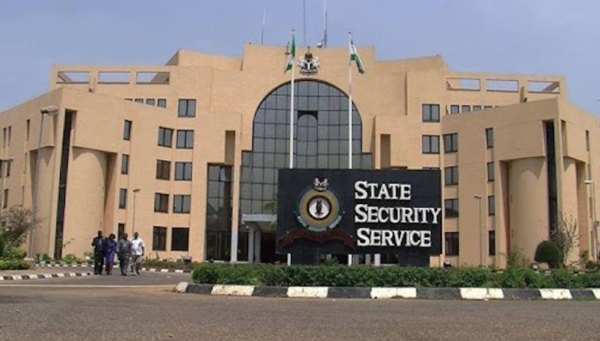
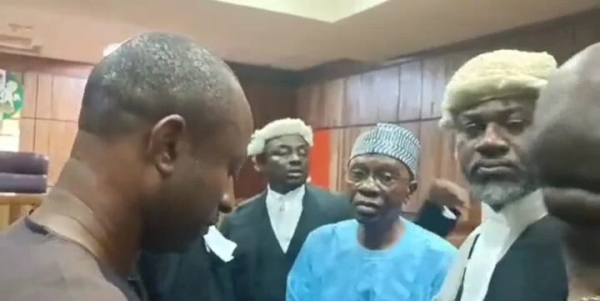

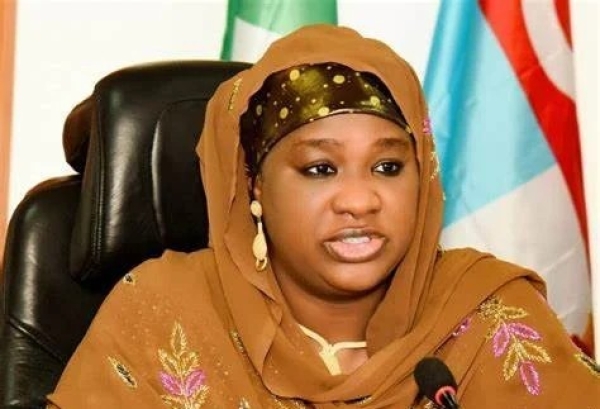
![[OPINION] Octopus Wike And The PDP - Reuben Abati](/media/k2/items/cache/0c132d1dd795979de9db14cc333bbe4d_XL.jpg?t=20250527_110203)
